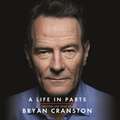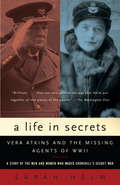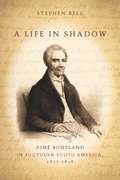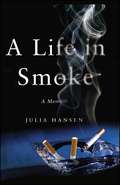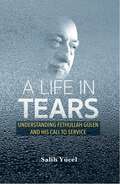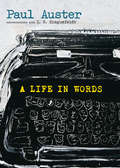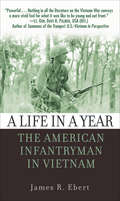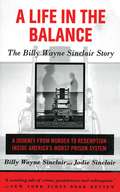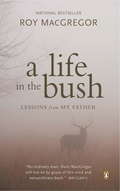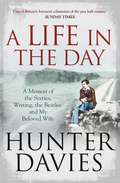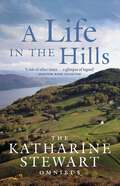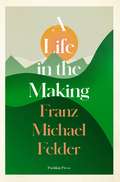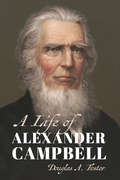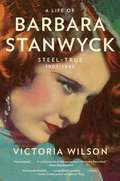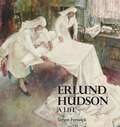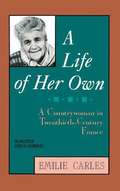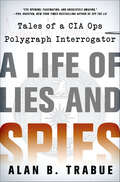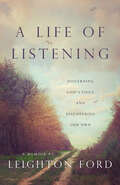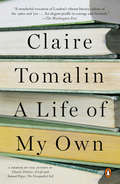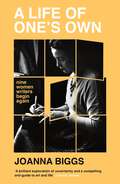- Table View
- List View
A Life in Parts
by Bryan Cranston'Bryan Cranston has created a cinematic record of how an actor shapes a career and an identity and a legacy all at the same time' Tom Hanks'A superb anecdotalist with an honest take on how he dealt with fame found later in life' SUNDAY TIMES CULTUREA poignant, intimate, funny, inspiring memoir - both a coming-of-age story and a meditation on creativity, devotion, and craft - from Bryan Cranston, beloved and acclaimed star of one of history's most successful TV shows, Breaking Bad.Bryan Cranston landed his first role at seven, when his father cast him in a United Way commercial. Acting was clearly the boy's destiny, until one day his father disappeared. Destiny suddenly took a backseat to survival.Now, in his riveting memoir, Cranston maps his zigzag journey from abandoned son to beloved star by recalling the many odd parts he's played in real life - paperboy, farmhand, security guard, dating consultant, murder suspect, dock loader, lover, husband, father. Cranston also chronicles his evolution on camera, from soap opera player trying to master the rules of show business to legendary character actor turning in classic performances as Seinfeld dentist Tim Whatley, "a sadist with newer magazines," and Malcolm in the Middle dad Hal Wilkerson, a lovable bumbler in tighty-whities. He also gives an inspiring account of how he prepared, physically and mentally, for the challenging role of President Lyndon Johnson, a tour de force that won him a Tony to go along with his four Emmys.Of course, Cranston dives deep into the grittiest details of his greatest role, explaining how he searched inward for the personal darkness that would help him create one of the most memorable performances ever captured on screen: Walter White, chemistry teacher turned drug kingpin.Discussing his life as few men do, describing his art as few actors can, Cranston has much to say about creativity, devotion, and craft, as well as innate talent and its challenges and benefits and proper maintenance. But ultimately A Life in Parts is a story about the joy, the necessity, and the transformative power of simple hard work.(p) 2016 Simon & Schuster
A Life in Secrets: Vera Atkins and the Lost Agents of SOE
by Sarah HelmDuring World War Two the Special Operation Executive's French Section sent more than 400 agents into Occupied France -- at least 100 never returned and were reported 'Missing Believed Dead' after the war. Twelve of these were women who died in German concentration camps -- some were tortured, some were shot, and some died in the gas chambers. Vera Atkins had helped prepare these women for their missions, and when the war was over she went out to Germany to find out what happened to them and the other agents lost behind enemy lines. But while the woman who carried out this extraordinary mission appeared quintessentially English, she was nothing of the sort. Vera Atkins, who never married, covered her life in mystery so that even her closest family knew almost nothing of her past. In A LIFE IN SECRETS Sarah Helm has stripped away Vera's many veils and -- with unprecedented access to official and private papers, and the cooperation of Vera's relatives -- vividly reconstructed an extraordinary life.
A Life in Shadow
by Stephen BellFrench naturalist and medical doctor Aimé Bonpland (1773-1858) was one of the most important scientific explorers of South America in the early nineteenth century. From 1799 to 1804, he worked alongside Alexander von Humboldt as the latter carried out his celebrated research in northern South America, but he later returned to conduct his own research farther south. A Life in Shadowaccounts for the entire span of Bonpland's remarkable and diverse career in South America-in Argentina, Paraguay (where he was imprisoned for nearly a decade), Uruguay, and southernmost Brazil-based on extensive archival material. The study reconnects Bonpland's divided records in Europe and South America and delves into his studies of rural resources in interior regions of South America, including experimental cultivation techniques. This is a fascinating account of a man-a doctor, farmer, rancher, scientific explorer, and political conspirator-who interacted in many revealing ways with the evolving societies and institutions of South America.
A Life in Smoke
by Julia Hansen"I accepted the certainty of my untimely death with gallows humor and a calculator. I'd read somewhere that each cigarette you smoke knocks seven minutes off your time on the planet. To amuse myself, I did the math: 153,000 cigarettes = two years of my life, up in smoke." Julia Hansen first lit up at nineteen. Twenty years later, she was editing books about health -- and smoking a pack or two a day. She denied her son fast food, but smoked in the house and car; curtailed his video games, but lit up at his soccer matches. Despite repeated attempts to quit, she always crawled back to her beloved menthol lights. Smoking had become a metaphorical chain around her neck, shackling her to an early death. Haunted by a nightmarish vision of her future -- her son at her deathbed, begging her not to leave him -- Hansen devised a drastic quit method. She bought a 72-foot length of chain that was "unwieldy as a corpse" and locked herself to a radiator in her dining room. What followed: seven days of cold-turkey misery, comic absurdity, and revelation as Hansen stepped from behind her wall of smoke to face her addiction to nicotine -- and some painful truths. Clanking around her house like Marley's ghost, white-knuckling cravings, and struggling to understand tobacco's unyielding grip on her, Hansen confronted her life in smoke: fractured relationships, lifelong battles with alcohol and depression, and a profound sense of emptiness. On day 1, the chain was her addiction to nicotine, each link a story about cigarettes and self-loathing. By day 7, it had revealed its ringing, rattling truth -- that every smoker has a story, and it always centers on clinging to a comfort that can kill you. In the end, Hansen's story was painfully simple: She smoked to survive her life. And then, to save it, she quit. Fierce and funny, honest and utterly absorbing, A Life in Smoke is Julia Hansen's evocative and inspiring account of the extreme measures she took to quit smoking -- decidedly not recommended by the medical profession.
A Life in Smoke
by Julia Hansen"I accepted the certainty of my untimely death with gallows humor and a calculator. I'd read somewhere that each cigarette you smoke knocks seven minutes off your time on the planet. To amuse myself, I did the math: 153,000 cigarettes = two years of my life, up in smoke." Julia Hansen first lit up at nineteen. Twenty years later, she was editing books about health -- and smoking a pack or two a day. She denied her son fast food, but smoked in the house and car; curtailed his video games, but lit up at his soccer matches. Despite repeated attempts to quit, she always crawled back to her beloved menthol lights. Smoking had become a metaphorical chain around her neck, shackling her to an early death. Haunted by a nightmarish vision of her future -- her son at her deathbed, begging her not to leave him -- Hansen devised a drastic quit method. She bought a 72-foot length of chain that was "unwieldy as a corpse" and locked herself to a radiator in her dining room. What followed: seven days of cold-turkey misery, comic absurdity, and revelation as Hansen stepped from behind her wall of smoke to face her addiction to nicotine -- and some painful truths. Clanking around her house like Marley's ghost, white-knuckling cravings, and struggling to understand tobacco's unyielding grip on her, Hansen confronted her life in smoke: fractured relationships, lifelong battles with alcohol and depression, and a profound sense of emptiness. On day 1, the chain was her addiction to nicotine, each link a story about cigarettes and self-loathing. By day 7, it had revealed its ringing, rattling truth -- that every smoker has a story, and it always centers on clinging to a comfort that can kill you. In the end, Hansen's story was painfully simple: She smoked to survive her life. And then, to save it, she quit. Fierce and funny, honest and utterly absorbing, A Life in Smoke is Julia Hansen's evocative and inspiring account of the extreme measures she took to quit smoking -- decidedly not recommended by the medical profession.
A Life in Tears: Understanding Fethullah Gulen's Life and His Call to Service
by Salih YucelFethullah Gülen is a leading figure in the current Turkish socio-political context. Regardless of the impression different circles have about him, he is universally acknowledged as an accomplished scholar and independent thinker who has had a life in tears dreaming of a &“golden generation,&” but also a life spent in persecution and ongoing trials. This book goes beyond the current controversy around his name, and tries to explore Gülen as a scholar around his certain personal traits and some of the key concepts he has been emphasizing over the years to mobilize his audience. Based on a research that covers over seventy books, 564 sermons, over 500 talks by Gülen, more than fifty interviews of his close associates and friends aired on TV networks, and the author&’s personal observations, this book is a useful reference for those who study scholarly traditions of Islam in general and Fethullah Gülen in particular.
A Life in The Wild: George Schaller's Struggle to Save the Last Great Beasts
by Pamela S. TurnerIn this biography, Pamela S. Turner examines the amazing life and groundbreaking work of the man International Wildlife calls the worlds foremost field biologist. Schaller's landmark research revolutionized field biology, demonstrating that it is possible to study dangerous animals in their own habitats: mountain gorillas in Central Africa, predatory tigers in India, mysterious snow leopards in the Himalayas, and many others.
A Life in Words: In Conversation with I. B. Siegumfeldt
by Paul Auster I. B. SiegumfeldtAn inside look into Paul Auster's art and craft, the inspirations and obsessions, mesmerizing and dramatic in turn.A remarkably candid, and often surprisingly dramatic, investigation into one writer's art, craft, and life, A Life in Words is rooted in three years of dialogue between Auster and Professor I. B. Siegumfeldt, starting in 2011, while Siegumfeldt was in the process of launching the Center for Paul Auster Studies at the University of Copenhagen. It includes a number of surprising disclosures, both concerning Auster's work and about the art of writing generally. It is a book that's full of surprises, unscripted yet amounting to a sharply focused portrait of the inner workings of one of America's most productive and successful writers, through all twenty-one of Auster's narrative works and the themes and obsessions that drive them.
A Life in a Year: The American Infantryman in Vietnam, 1965-1972
by James R. EbertThis provocative in-depth book focuses on the experiences of the infantry soldier in Vietnam. More than 60 Army and Marine Corps infantrymen speak of their experiences during their year-long tours of duty.
A Life in the Balance: The Billy Wayne Sinclair Story, A Journey from Murder to Redemption Inside America's Worst Prison System
by Billy Wayne Sinclair Jodie SinclairSentenced to death in 1965 at age twenty for an unpremeditated murder during the bungled holdup of a convenience store, Billy Wayne spent his first seven prison years on death row. When the death penalty was abolished, his sentence was life. Three-and-a-half decades later, Billy Wayne is still behind bars-feared by many politicians and prison officials for his well-known incorruptibility and unrelenting crusade for prison reform. This is his memoir.A Life in the Balance begins with an almost unbearable account of his early years-when he was so abused by his father one wonders how he survived-and his "escape" into a crowd of hooligans, which led him to the fateful day in 1965 when he held up the convenience store. His story takes you behind the metal doors of the Angola State Penitentiary to reveal the brutal truth of life inside. Here you will meet Billy Ray, Billy Wayne's blood brother; old Emmitt Henderson, who died of prison neglect; Jamie Parks, a seventeen-year-old kid whose fate was sealed the day he arrived in Angola; Big Mick, who ran drugs in the prison to earn money to put his handicapped sister through college; Wilbert Rideau, Billy Wayne's coeditor on The Angolite; the Dixie Mafia; and Richard Clark Hand, the young lawyer who took on Billy Wayne's case and has been fighting for his release for thirty years.
A Life in the Bush
by Roy MacgregorWinner of The CAA-Birks Family Foundation Award for Biography The 2000 Ottawa-Carlton Book Award The (U.S.) Rutstrum Award for Best Wilderness Book "A portrait of a true original."--The Hamilton Spectator In 1929, at the age of twenty-two, Duncan MacGregor, the son of a lumberman, great-grandson of a voyageur, and an avid reader and baseball fan, headed off into the largest tract of preserved bush in the world: Ontario's Algonquin Park. When he got there, he was home for the rest of his life. From the true nature of fishing to the harsh realities of raising a family in the woods, from the role of fear in the bush to the small nuances of family relationships, A Life in the Bush is painted on a canvas both vast and richly detailed. A story that captures the tough physical demands, the rich life of the senses, and the unselfconscious freedom that comes from living apart from town and city. In this beautifully crafted memoir of his father, Roy MacGregor paints an intimate portrait of an unusual man and spins a spellbinding tale of a boy's complex relationship with his father. He also evokes, perhaps for the first time in Canadian literature, the bush the way bush people see it, an insider's view of life in the totemic Canadian wilderness.
A Life in the Day
by Hunter Davies'Ken Loach might have turned all this into a powerful social film, but the avuncular Davies sprinkles in so many cheery anecdotes that the book bounces along enjoyably' (Sunday Times) - Praise for VOLUME 1: THE CO-OP'S GOT BANANAS! Hunter Davies’ childhood lived amongst the post-war dirt and grime of Carlisle was immediately hailed as a classic memoir from one of Britain’s foremost columnists of the past half century. The Co-op’s Got Bananas! left our protagonist at the cusp of working for one of the world’s greatest newspapers – The Sunday Times. In this much-anticipated sequel, Hunter now looks back across five decades of successful writing to reflect on his colourful memories of the living in London during the height of the Swinging Sixties, becoming editor of Britain’s first colour weekend supplement The Sunday Times magazine; where he befriended the Beatles; and reporting on (and partying with) some of the biggest names in television, film and theatre of the day. As time moved on into the 1970s, '80s and '90s, Hunter encountered the likes of Sir Michael Caine, George Best, Melvyn Bragg, Joan Bakewell, Sir Sean Connery, Cilla Black, Paul Gascoigne, and Wayne Rooney to name a few. Hunter brings the story full circle to reflect on his years spent with the love of his life – the bestselling writer Margaret Forster, who sadly passed away in February 2016. This will not only be a colourful and enjoyable memoir of what it was like to be at the epicentre of Britain’s artistic heart, but also an emotional, heart-felt tribute to family, friends and colleagues. For those captivated by The Co-op’s Got Bananas!,this sequel is a must read.
A Life in the Hills: The Katharine Stewart Omnibus
by Katharine StewartA collection of memoirs about an English woman and her family giving up city life for the Scottish Highlands in the 1950s. Katharine Stewart, who died in 2013, was one of Scotland&’s best-loved writers on rural life in the Highlands. A Croft in the Hills, her first book, tells the story of how a couple and their young daughter, fresh from city life, took over a remote hill croft near Loch Ness and made a living from it. Full of warm personal insights, good humor and a love of living things, it has become a classic and has rarely been out of print since it was first published in 1960. This omnibus gathers A Croft in the Hills together with some of Katharine&’s later books: A Garden in the Hills, describing a year in the life of her Highland garden; A School in the Hills, a history of the school at Abriachan that eventually became the Stewarts&’ family home; and The Post in the Hills, which tells the story of the postal service in the Highlands, from the point of view of Katharine&’s later role as postmistress of the smallest post office in Scotland, run from the porch of her Abriachan schoolhouse. Each of these books glows with what Neil Gunn described as &“its unusual quality, its brightness and its wisdom.&” The omnibus brings the grace, charm, and wisdom of Stewart&’s writing to a new generation of readers.Praise for Katharine Stewart&“Stewart&’s memories are, as she says herself a tale of other times, almost a glimpse of legend . . . Evocative and charming.&” —Scottish Book Collector on A Croft in the Hills
A Life in the Making
by Franz Michael FelderThe inspiring, meditative classic autobiography of a pioneering nineteenth-century autodidact and writer, in English for the first timeOver the 29 years of his short life, Franz Michael Felder worked with furious productivity to better himself and the lives of those around him. From his humble origins in the Austrian village of Schoppernau, he went on to found workers' cooperatives, a political party and even a public library in his own home, as well as writing many literary works. A Life in the Making is both the culmination of this extraordinary career and a chronicle of its development. It is a story of early hardship and fortitude, of Felder's relentless zeal for learning and his lifelong effort to reconcile his own expanding horizons with the enforced confines of the community he was born to. Unfolding in prose of limpid beauty, A Life in the Making becomes a deeply moving tribute to Felder's wife Nanni, and to his enduring belief in the possibility of a better world.
A Life of Alexander Campbell (Library of Religious Biography (LRB))
by Douglas A. FosterThe first critical biography of Alexander Campbell, one of the founders of the Stone-Campbell Movement A Life of Alexander Campbell examines the core identity of a gifted and determined reformer to whom millions of Christians around the globe today owe much of their identity—whether they know it or not. Douglas Foster assesses principal parts of Campbell&’s life and thought to discover his significance for American Christianity and the worldwide movement that emerged from his work. He examines Campbell&’s formation in Ireland, his creation and execution of a reform of Christianity beginning in America, and his despair at the destruction of his vision by the American Civil War. A Life of Alexander Campbell shows why this important but sometimes misunderstood and neglected figure belongs at the heart of the American religious story.
A Life of Alexander Campbell (Library of Religious Biography (LRB))
by Douglas A. FosterThe first critical biography of Alexander Campbell, one of the founders of the Stone-Campbell Movement A Life of Alexander Campbell examines the core identity of a gifted and determined reformer to whom millions of Christians around the globe today owe much of their identity—whether they know it or not. Douglas Foster assesses principal parts of Campbell&’s life and thought to discover his significance for American Christianity and the worldwide movement that emerged from his work. He examines Campbell&’s formation in Ireland, his creation and execution of a reform of Christianity beginning in America, and his despair at the destruction of his vision by the American Civil War. A Life of Alexander Campbell shows why this important but sometimes misunderstood and neglected figure belongs at the heart of the American religious story.
A Life of Barbara Stanwyck
by Victoria WilsonFifteen years in the making, the first volume of the full-scale astonishing life of one of our greatest screen actresses whose career in pictures spanned four decades beginning with the coming of sound--the first to delve deeply into Stanwyck's rich, complex life and to explore her extraordinary range of eighty-eight motion pictures, many of them iconic; her work, her world, her Hollywood through an American century.Frank Capra called her, "The greatest emotional actress the screen has yet known." Yet she was one of its most natural, timeless, and underrated stars. Now Victoria Wilson, gives us the most complete portrait we have yet had, or will have, of this magnificent actresses, seen as the quintessential Brooklyn girl whose family was in fact of old New England stock...her years in New York as dancer and Broadway star...her fraught marriage to Frank Fay, Broadway genius, who influenced a generation of actors and comedians (among them, Jack Benny and Stanwyck herself)...the adoption of a son, embattled from the outset; her partnership with the "unfunny" Marx brother, Zeppo, together creating one of the finest horse breeding farms in the west; her fairytale romance and marriage to the younger Robert Taylor, America's most sought-after male star...Here is the shaping of her career working with many of Hollywood's most important directors: among them, Capra, King Vidor, Cecil B. Demille, Preston Sturges, all set against the times--the Depression, the rise of the unions, the coming of World War II and a fast-evolving coming-of-age motion picture industry. At the heart of the book, Stanwyck herself--her strengths, her fears, her desires--how she made use of the darkness in her soul, keeping it at bay in her private life, transforming herself from shunned outsider into one of Hollywood's--and America's--most revered screen actresses. Written with full access to Stanwyck's family, friends, colleagues, and never-before-seen letters, journals and photographs.
A Life of Barbara Stanwyck
by Victoria WilsonFrank Capra called her "The greatest emotional actress the screen has yet known." She was one of its most natural, timeless, and underrated stars. Now, Victoria Wilson gives us the first full-scale life of Barbara Stanwyck, whose astonishing career in movies (eighty-eight in all) spanned four decades beginning with the coming of sound, and lasted in television from its infancy in the 1950s through the 1980s--a book that delves deeply into her rich, complex life and explores her extraordinary range of motion pictures, many of them iconic. Here is her work, her world, her Hollywood. We see the quintessential Brooklyn girl whose family was in fact of old New England stock . . . her years in New York as a dancer and Broadway star . . . her fraught marriage to Frank Fay, Broadway genius, who influenced a generation of actors and comedians (among them, Jack Benny and Stanwyck herself ) . . . the adoption of a son, embattled from the outset; her partnership with the "unfunny" Marx brother, Zeppo, crucial in shaping the direction of her work, and who, together with his wife, formed a trio that created one of the finest horse-breeding farms in the west; her fairy-tale romance and marriage to the younger Robert Taylor, America's most sought-after-- and beautiful--male star. Here is the shaping of her career with many of Hollywood's most important directors: among them, Frank Capra, "Wild Bill" William Wellman ("When you get beauty and brains together," he said, "there's no stopping the lucky girl who possesses them. The best example I can think of is Barbara"), King Vidor, Cecil B. De Mille, and Preston Sturges, all set against the times--the Depression, the New Deal, the rise of the unions, the advent of World War II--and a fast-changing, coming-of-age motion picture industry. And here is Stanwyck's evolution as an actress in the pictures she made from 1929 through the summer of 1940, where Volume One ends--from her first starring movie, The Locked Door ("An all-time low," she said. "By then I was certain that Hollywood and I had nothing in common"); and Ladies of Leisure, the first of her six-picture collaboration with Frank Capra ("He sensed things that you were trying to keep hidden from people. He knew. He just knew"), to the scorching Baby Face, and the height of her screen perfection, beginning with Stella Dallas ("I was scared to death all the time we were making the picture"), from Clifford Odets's Golden Boy and the epic Union Pacific to the first of her collaborations with Preston Sturges, who wrote Remember the Night, in which she starred. And at the heart of the book, Stanwyck herself--her strengths, her fears, her frailties, her losses and desires; how she made use of the darkness in her soul in her work and kept it at bay in her private life, and finally, her transformation from shunned outsider to one of Hollywood's--and America's--most revered screen actresses. Writing with the full cooperation of Stanwyck's family and friends, and drawing on more than two hundred interviews with actors, directors, cameramen, screenwriters, costume designers, et al., as well as making use of letters, journals, and private papers, Victoria Wilson has brought this complex artist brilliantly alive. Her book is a revelation of the actor's life and work.
A Life of Erlund Hudson: A Life (Peridot Press Ser.)
by Simon FenwickErlund Hudson's etchings, sketches and watercolours are nearly always concerned with women at work or at rest, in wartime, domestic or ballet scenes. After a mere 20 years as a professional artist Hudson abandoned painting and became involved in the world of ballet, working as artistic director at the Brooking School of Ballet with Nesta Brooking, her companion of almost 50 years. Although Hudson's output as an artist was relatively small, its significance is shown in that her work can now be found in important collections in Great Britain and North America, including the Imperial War Museum. In this first biography of Eleanor Erlund Hudson (1912-2011) Simon Fenwick creates a moving and informative portrait of the woman and the artist during her long life. The fully illustrated monograph also includes a list of her pictures shown by exhibiting societies during her lifetime.
A Life of Erlund Hudson: A Life (Peridot Press Ser.)
by Simon FenwickErlund Hudson's etchings, sketches and watercolours are nearly always concerned with women at work or at rest, in wartime, domestic or ballet scenes. After a mere 20 years as a professional artist Hudson abandoned painting and became involved in the world of ballet, working as artistic director at the Brooking School of Ballet with Nesta Brooking, her companion of almost 50 years. Although Hudson's output as an artist was relatively small, its significance is shown in that her work can now be found in important collections in Great Britain and North America, including the Imperial War Museum. In this first biography of Eleanor Erlund Hudson (1912-2011) Simon Fenwick creates a moving and informative portrait of the woman and the artist during her long life. The fully illustrated monograph also includes a list of her pictures shown by exhibiting societies during her lifetime.
A Life of Lies and Spies: Tales of a CIA Covert Ops Polygraph Interrogator
by Alan B. TrabueAlan Trabue chose a bizarre, dangerous way to make a living. In A Life of Lies and Spies, Trabue exposes the often perilous world of polygraphing foreign spies in support of CIA espionage programs. He recounts his incredible, true-life globe-trotting adventures, from his induction in the CIA in 1971 to directing the CIA's world-wide covert ops polygraph program.A Life of Lies and Spies brings readers into the high-stakes world of covert operations and the quest to uncover deceit, featuring a high-speed car chase, blown clandestine meetings, surreptitious room searches, tear-gassing by riot police, and confrontations with machine gun-armed soldiers. Liberally sprinkled with side anecdotes—such as debriefing an agent though a torturous swarm of mosquitoes in a jungle shack—Trabue's story highlights both the humor and the intrinsic danger of conducting CIA covert activities.Writing from a unique perspective framed by his uncommon longevity and broad experience, for which he was awarded the Career Intelligence Medal, Trabue's memoir unveils the CIA's use of polygraph and interrogation to validate recruited spies' bona fides and information obtained through their acts of espionage.The Central Intelligence Agency has not approved, endorsed or authorized this book or the use of the CIA seal, name or initials.
A Life of Listening: Discerning God's Voice and Discovering Our Own
by Leighton FordThe Christian life is a life of listening.
A Life of My Own: A Memoir
by Claire TomalinEsteemed biographer and legendary literary editor Claire Tomalin's stunning memoir of a life in literature“[An] intelligent and humane book…There is genuine appeal in watching this indomitable woman continue to chase the next draft of herself." —Dwight Garner, The New York TimesIn A Life of My Own, the renowned biographer of Charles Dickens, Samuel Pepys, and Thomas Hardy, and former literary editor for the Sunday Times reflects on a remarkable life surrounded by writers and books. From discovering books as a form of escapism during her parents' difficult divorce, to pursuing poetry at Cambridge, where she meets and marries Nicholas Tomalin, the ambitious and striving journalist, Tomalin always steered herself towards a passionate involvement with art. She relives the glittering London literary scene of the 1960s, during which Tomalin endured her husband's constant philandering and numerous affairs, and revisits the satisfaction of being commissioned to write her first book, a biography of the early feminist Mary Wollstonecraft. In biography, she found her vocation. However, when Nick is killed in 1973 while reporting in Israel, the mother of four put aside her writing to assume the position of literary editor of the New Statesman. Her career soared when she later moved to the Sunday Times, and she tells with dazzling candor of this time in her life spent working alongside the literary lights of 1970s London. But, the pain of her young daughter's suicide and the challenges of caring for her disabled son as a single mother test Claire's strength and persistence. It is not until later in life that she is able to return to what gave her such purpose decades ago, writing biographies, and finds enduring love with her now-husband, playwright Michael Frayn. Marked by honesty, humility, and grace, rendered in the most elegant of prose, A Life of My Own is a portrait of a life, replete with joy and heartbreak. With quiet insight and unsparing clarity, Tomalin writes autobiography at its most luminous, delivering an astonishing and emotionally-taut masterpiece.
A Life of One's Own: Nine Women Writers Begin Again
by Joanna BiggsI took off my wedding ring - a gold band with half a line of 'Morning Song' by Sylvia Plath etched inside - and for weeks afterwards, my thumb would involuntarily reach across my palm for the warm bright circle that had gone. I didn't throw the ring into the long grass, like women do in the movies, but a feeling began bubbling up nevertheless, from my stomach to my throat: it could fling my arms out. I was free.A few years into her marriage and feeling societal pressure to surrender to domesticity, Joanna Biggs found herself longing for a different kind of existence. Was this all there was? She divorced without knowing what would come next.Newly untethered, Joanna returned to the free-spirited writers of her youth and was soon reading in a fever - desperately searching for evidence of lives that looked more like her own, for the messiness and freedom, for a possible blueprint for intellectual fulfillment.In A Life of One's Own, Mary Wollstonecraft, George Eliot, Zora Neale Hurston, Virginia Woolf, Simone de Beauvoir, Sylvia Plath, Toni Morrison, and Elena Ferrante are all taken down from their pedestals, their work and lives seen in a new light. Joanna wanted to learn more about the conditions these women needed to write their best work, and how they addressed the questions she herself was struggling with: Is domesticity a trap? Is life worth living if you have lost faith in the traditional goals of a woman? Why is it so important for women to read one another?This is a radical and intimate examination of the unconventional paths these women took - their pursuits and achievements but also their disappointments and hardships. And in exploring the things that gave their lives the most meaning, we find fuel for our own singular intellectual paths.
